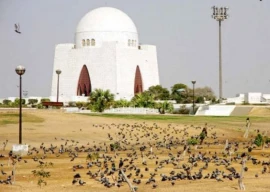
Democracy is far from extinct in Pakistan and the high voter turnout in the elections has posed a governance challenge to the major political parties. This was stated by Centre for Civic Education Pakistan (CCEP) Executive Director Zafarullah Khan on Thursday.
He was speaking at a seminar titled “Verdict-2013: Implications for Pakistani Federalism - Promise, Potential & Peril” at the CCEP office.
“It appears that a lot of parties have lost their federal appeal, but perhaps new contours of federalism have emerged,” Khan said, pointing out that 12 of the newly elected parties had voted for the 18th Amendment in the previous tenure. The constitutional amendment took away the President’s powers to dissolve Parliament and gave more autonomy to the provinces.
Khan said the constitutional design has been improved to such an extent that the federal government and the federating units will have no choice but to cooperate.
He highlighted several challenges that the incoming Pakistan Muslim League-Nawaz (PML-N) might face in its relations with the provinces.

Thorny issues
Sharing the defence bill in the eighth National Finance Commission (NFC) award, upcoming presidential elections, PML-N’s fewer numbers in Senate, and the functionality of forums such as the Council of Common Interests and the National Economic Council will all test PML-N’s mettle, Khan stated.
The PML-N leadership in Punjab was a vehement advocate for devolution during the previous government and it remains to be seen whether they will continue their old stance or overlook it now that they are in power, he added.
The PML-N is the only party which won seats in all federating units, the Federally Administered Tribal Areas and Islamabad Capital Territory, informed Khan. He also highlighted that the party’s manifesto was written in a “federalist idiom” and its contents imply a commitment for cooperation for the sake of democracy.
Federalist track record of the PML-N
Khan informed that the Council of Common Interests (CCI) — the body handling disputes between the federal government and provinces — held only 11 meetings from 1973 to 2010, of which six were held during Nawaz Sharif’s two terms as prime minister. The fourth NFC award of 1990 and the Water Accord of 1991 occurred under a PML-N government.
But during previous PML-N rule, the federal government did not have the best relationship with the provincial governments, which sometimes manifested as a military operation in Karachi or nuclear tests in Chaghai without taking chief minister of Balochistan in confidence.
Demand for new provinces
During the presentation Khan emphasised that of the newly elected political parties, those that demanded new provinces — the Bahawalpur National Awami Party (BNAP), Tehrik-i-Sooba Hazara and even the Pakistan People’s Party (PPP) — did not get support from the electorate in the areas considered for new provinces such as South Punjab and Hazara division of Khyber-Pakhtunkhwa. The election results seem to suggest that voters were more concerned about governance issues than creation of new provinces, Khan concluded.
Published in The Express Tribune, May 31st, 2013.
1731570357-0/elon-musk-(1)1731570357-0-405x300.webp)
-(1)1717678110-0/Kendrick-(1)-(1)1717678110-0-165x106.webp)






1732428532-0/BeFunk_§_]__-(43)1732428532-0.jpg)








COMMENTS
Comments are moderated and generally will be posted if they are on-topic and not abusive.
For more information, please see our Comments FAQ